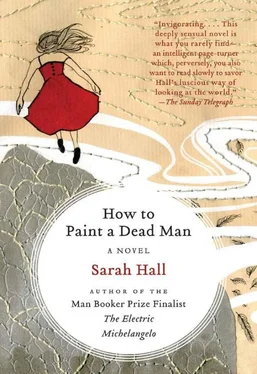Sarah Hall - How to Paint a Dead Man
Здесь есть возможность читать онлайн «Sarah Hall - How to Paint a Dead Man» весь текст электронной книги совершенно бесплатно (целиком полную версию без сокращений). В некоторых случаях можно слушать аудио, скачать через торрент в формате fb2 и присутствует краткое содержание. Год выпуска: 2009, Издательство: Harper Perennial, Жанр: Современная проза, на английском языке. Описание произведения, (предисловие) а так же отзывы посетителей доступны на портале библиотеки ЛибКат.
- Название:How to Paint a Dead Man
- Автор:
- Издательство:Harper Perennial
- Жанр:
- Год:2009
- ISBN:нет данных
- Рейтинг книги:4 / 5. Голосов: 1
-
Избранное:Добавить в избранное
- Отзывы:
-
Ваша оценка:
- 80
- 1
- 2
- 3
- 4
- 5
How to Paint a Dead Man: краткое содержание, описание и аннотация
Предлагаем к чтению аннотацию, описание, краткое содержание или предисловие (зависит от того, что написал сам автор книги «How to Paint a Dead Man»). Если вы не нашли необходимую информацию о книге — напишите в комментариях, мы постараемся отыскать её.
, Sarah Hall, "one of the most significant and exciting of Britain's young novelists" (
), delivers "a maddeningly enticing read... an amazing feat of literary engineering" (
).
How to Paint a Dead Man — читать онлайн бесплатно полную книгу (весь текст) целиком
Ниже представлен текст книги, разбитый по страницам. Система сохранения места последней прочитанной страницы, позволяет с удобством читать онлайн бесплатно книгу «How to Paint a Dead Man», без необходимости каждый раз заново искать на чём Вы остановились. Поставьте закладку, и сможете в любой момент перейти на страницу, на которой закончили чтение.
Интервал:
Закладка:
He bends again, shouting into the granite stadium, and the noise echoes back at him. ‘Fuck you.’ ‘Fuck you.’ Again he reaches to the laces. He picks at the knot, loosens the binding a fraction. Again he rises, shouts, again he bends. Five more times he goes down into the torment, yelling, dashing the water from his eyes, fighting the threshold. He undoes the double knot, pulls the laces from the metal eyelets, loosens the tongue.
There are days when he comes home and stands at the cottage door for a moment, worrying that everything inside has disappeared. He imagines the floor has dropped out and nothing is left and no one is there and he is not who he thought he was. He has to tell himself that, when he opens the door, Lydia will be sitting in the blue armchair by the range, keeping it alight. Her hair will be loose or knotted in a bun at her neck. Next to the chair will be her embroidery bag, the one she collects sloes and elderberries in this time of year. The one she used to carry the twins about in when they were tiny. He simply has to trust, now, that she will be there.
He takes hold of the leg with both hands and pulls as hard as he can.
Translated from the Bottle Journals
The rain has been keeping us indoors by the fire, but this morning the weather has broken and I am able to venture outside. I try not to dwell on my condition but I am asked frequently by the doctor and Theresa and Antonio to describe my discomforts. What can I tell them? Yes, it is uncomfortable. I have no appetite. I am thinner. Something dark consumes me from inside; it has multiplied and has entered the lymph system. There is no miracle. Everything has slowed — my writing, my movements, the paintbrush. I am full of sorrow for the loss of delicate fragrances. I can no longer smell the herbs or the rain or cinabrese. Even my old friend paper is too subtle with his cologne! But I am noticing other things more sharply. A cherry stone darkening on one side while the other remains pale and lit, like this remarkable planet. A piece of coral from the shelf is uncomfortably crisp to hold, as if baked almost to desiccation by salt kilns. I make these observations with a sense of wonder, and am only roused when Theresa comes into the room and asks what it is that I have forgotten or am looking for, and why I am stalled.
I am kindly forgiven for wearing this old robe, with ragged cuffs, when visitors arrive. Antonio limits the time of anyone wishing to call upon me, and now refuses to let me give interviews. This is a relief, and I am thankful. The newspapers are already commemorating my life, it seems, though the speculation about the motifs continues. More reporters would like to come, but the door of the studio is closed to them. One day one of them will write a simple sentence.
I must fortify myself and commit myself to putting the studies and canvases in order. They lean against the walls every which way and are not in series. Antonio is doing much lifting and carrying; he goes beyond his call of duty. The accounting has been done. The papers have gone to the solicitor. I know nothing of archives; needless to say, I am no clerk, and I leave much work for them to do! The house is to be left to my wife’s family. They will have to excuse its gardens. There is a sense of preparation here at Serra Partucci, and it is strange to think that I will not need luggage, or even a hat upon my head, for my departure. I strongly feel that I should fold my clothes, press my shirts and polish my shoes.
I have begun several letters to Peter. Each sounds too conclusive and too imperative, and each has been discarded. I have no wish to depress him, nor should I press upon him any methodology for working. I wish only to say his correspondence has given me great pleasure. He will find his way, I am certain. I was schooled with Nelo Ungaretti, the great mathematician and architect, a man of such vivacity that all who knew him were certain he would prosper in his field, and though the war sadly robbed us of him, he was indeed triumphant. I believe Peter has Ungaretti’s qualities.
I have sent my best wishes to the children in the school, and to Signora Russo I have donated many books. Upon my request, Giancarlo brought his small dog here and permitted me to stroke him. He has proved to be a good forager. Giancarlo and I talked fondly while the dog ran about, sniffing in the corners of the house. Theresa was nervous throughout the meeting and kept her hands tightly linked. Perhaps she thought our discussion would move on to politics or that I would embarrass her with praise. I have made small provision for the family in the will but I have not mentioned this in case they will not accept it. The doctor has given me a small supply of morphine for the coming days. I have not yet taken any.
My mind reaches back into the past. Today, as if finding a lost charm or trinket, I have suddenly recalled the infant nickname my mother gave me. Gyri. I have remembered my mother’s voice calling from the orchard of Via Lame, calling to me now, sixty years after she passed away. I recall the woven basket she wore over her shoulder with its red scarf under the strap, the pop and rustle as each fruit was snapped from the branches and placed without bruising into the container on her hip, and the pollen shaken down into her hair. One does not question God. One does not question a life beyond this. We cannot understand or predict. But if such a thing should exist, and if the beloved remain there, then how willingly I am gathered.
The voice calling is not my mother’s; it is Theresa’s. She has arrived early. She is keeping kind hours. She has rested her parched bicycle against the gate with its pedal between the railings. She has come into the house and has begun to prepare breakfast for her patient. I must extinguish my cigarette!
Now there are medical procedures to be endured, for which I need her help. I will pause and resume after.
The painting of the blue bottles is almost finished now. I am pleased with it. Standing at the easel is difficult, as I have less strength. I have tried sitting but it is an uncustomary position-the canvas is tall and awkward, as the artist must have been all his life! I am committed much of the time to my bed, and it is a comfort to look over and see this composition nearing completion. The bottles on the studio table collect and empty their bright tides as the light of each day arrives and passes. What can be said of them finally? I do not know. They are not consolation, but they have always been sufficient.
The artistic efforts of men are indicative of our human openness, our inquisitiveness, I think. When we attempt to evaluate, or to obviate, we seldom guess correctly. Our minds are born nervous, in darkness. We are subterranean beings. We must learn by the senses and continue to be instinctual, to use the antennae. The oils of lavender bring sleep when we apply them to the pillow. Aniseed stirs us. In the museums, we must believe in the Dutch trick, the red deer, and the monk beneath the vast sky. We must look at the reality, and then look again at the illusion. We must see beyond. For what shakes the eye but the invisible?
Theresa is calling for me to come inside and eat. I must obey her or there will be unrest in the house and the broom will come out. I cannot be responsible for the decimation of our lizard population! But the view from the veranda is marvellous, and I linger.
I abhor catastrophe in all forms. There has been much I have wished to retain and repair. There is so much still to order. Yet I wait for the snow to arrive on the mountains.
The Mirror Crisis
You hold the thin plastic device in your hand, watching the strip for a blue line, which may or may not appear. The bathroom door is locked. The blinds are drawn. Opposite you is your reflection. Nathan is in the kitchen — you can hear the gonging of pans as he lifts one out of the cupboard, the hiss of the tap, and the bowing of water as the metal hull fills. The lid of the toilet seat is cold on the backs of your legs. There are small hexagonal tiles under your feet, the edges of which you trace with your toes. This is a scenario you were never sure you would experience. You have always been ambivalent about children. But here you are. You’ve followed the test instructions with clinical precision. The box tells you the percentage of accuracy is high. You are in the hands of trustworthy science. Science will scout out the correct hormones, distinguishing them, or declaring their absence. The tiny portable laboratory in your hand is, at this moment, going about its business.
Читать дальшеИнтервал:
Закладка:
Похожие книги на «How to Paint a Dead Man»
Представляем Вашему вниманию похожие книги на «How to Paint a Dead Man» списком для выбора. Мы отобрали схожую по названию и смыслу литературу в надежде предоставить читателям больше вариантов отыскать новые, интересные, ещё непрочитанные произведения.
Обсуждение, отзывы о книге «How to Paint a Dead Man» и просто собственные мнения читателей. Оставьте ваши комментарии, напишите, что Вы думаете о произведении, его смысле или главных героях. Укажите что конкретно понравилось, а что нет, и почему Вы так считаете.












